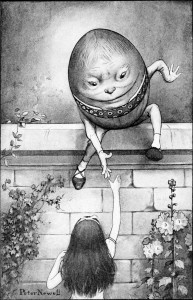In The Shadows of the Mind, Roger Penrose spends many pages discussing whether calculating machines (computers) can match human intelligence. Penrose proposes to elucidate the nature of human consciousness through modern mathematical discoveries and quantum physics. He is working out the implications of Godel’s Theorem but in reverse, so to speak. Since we cannot completely prove any axiomatic system in mathematics, when we do discover truth in mathematics , this must be some type of intuition and awareness unique to the human mind. Such awareness cannot be reduced to “mere” calculation.
GP: Penrose never delineates how the rules for human intelligence and understanding are different from “mere” calculation. He seems to be aiming at an elucidation of the cognitive areas of consciousness separate from feelings. But intelligence requires emotions and feelings. They are a necessary adjunct for successful cognitive functioning . C.I. Lewis wrote about this before the Age of Computers was underway in full force.
“Knowledge, action, and evaluation are essentially connected. The primary and pervasive significance of knowledge lies in its guidance of action: knowing is for the sake of doing. And action, obviously, is rooted in evaluation. For a being which did not assign comparative values, deliberate action would be pointless; and for one which did not know, it would be impossible. Conversely, only an active being could have knowledge and only such a being could assign values to anything beyond his own feelings. A creature which did not enter into the process of reality to alter in some part the future content of it, could apprehend a world only in the sense of intuitive or esthetic contemplation; and such contemplation would not possess the significance of knowledge but only that of enjoying a and suffering.
“The interest of action is not an interest in what is before us, on its own account, but an interest in what will be or may be . And the interest of that knowledge of the world which guides our action is the same. For the cognizing mind, something immediately presented – some item of direct experience – is a sign of something else, not so present but likely to become realized or capable of being realized in further experience. Only so can what is said to be known be something capable of being verified; since obviously, to verify is to submit what is in question to the test of some experience, not given when the verification is called for but which may be given. Further; what an empirical cognition thus predicts as capable of being verified will, in the typical case if not in all cases, depend in some part on our action. If verification does not of itself and necessarily imply action, at least it is only where what is apprehended is conditional upon action that knowledge could be other than futile. A predicted future which should follow fatally upon what is presently given, is a future it would be pointless to foresee, since ex hypothesi nothing could be done about it. Knowledge which serves for the guidance of action must anticipate the future, but a future to which the action itself will make a possible difference.” (CI Lewis, Analysis of Knowledge and Valuation , p. 1).
For The Intuitive Factor in Psak, (Hebrew) click here:
For Computer Power and Human Reason click here:


